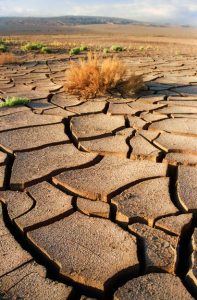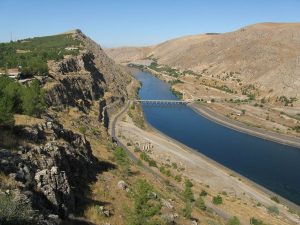Has the Euphrates River Dried Up
The Euphrates River, with its rich historical and cultural significance, has long been a vital watercourse in the Middle East. However, recent concerns have arisen regarding its water levels and whether the river has dried up. In this article, we delve into the current status of the Euphrates River, the factors contributing to its water levels, and the potential implications for the region.
Understanding the Euphrates River
The Euphrates River, often referred to as “Furat” in Arabic, flows through several countries, including Turkey, Syria, and Iraq. It has played a significant role in shaping the history of the region, serving as a crucial water source for agriculture, trade, and sustenance for centuries.
Challenges to Water Flow
The changing climate patterns and alterations in precipitation levels have led to fluctuating water flows in the Euphrates. Additionally, the construction of dams and water diversion projects upstream has impacted the downstream water availability, raising concerns about reduced water levels. Read more about How Many Instruments Did Prince Play
The Impact on Ecosystems
The diminishing water levels have caused disturbances in the river’s ecosystems. Wetlands, marshes, and habitats that depend on the river’s water have been affected, posing a threat to various plant and animal species. Biodiversity loss is a looming concern.
Human Dependence on the Euphrates
The Euphrates sustains vital sectors like agriculture and provides drinking water to communities across its course. Agriculture heavily relies on the river’s water for irrigation, making its availability a crucial factor in food production.
Geopolitical Concerns
The river’s water scarcity has led to geopolitical tensions among countries sharing its waters. With water becoming a strategic resource, negotiations and cooperation for equitable water distribution have become crucial.
Measuring the Water Levels
Scientific tools such as satellite data and ground-level measurements are used to gauge the Euphrates’ water levels. These measurements help in understanding the extent of water loss and fluctuations over time.
Drying Up or Seasonal Variations?
While concerns of the Euphrates drying up are valid, it’s important to recognize the role of natural fluctuations in its water levels. The river has historically experienced variations due to seasonal changes and drought cycles.
Addressing the Issue
To combat the challenges, sustainable water management practices must be adopted. This includes efficient use of water resources, improved irrigation techniques, and international agreements for responsible water usage.

Potential Scenarios
While the worst-case scenario of the Euphrates completely drying up is dire, experts suggest that with concerted efforts, the impacts can be mitigated. Collaborative strategies and effective policies can ensure a more optimistic outcome.
The Role of Local Communities
The river has profound cultural significance for local communities, who often possess traditional knowledge about water management. Their involvement in conservation efforts can significantly contribute to protecting the Euphrates. Also, read about Indian Restaurants in New Jersey
A Call to Action
Raising awareness about the Euphrates’ situation is essential to garner support for its conservation. Individuals, communities, and governments must recognize their roles in preserving this vital resource for future generations.
Potential Future Initiatives
Looking ahead, several initiatives can help address the challenges faced by the Euphrates River:
1. International Collaborations
- Establishing multilateral agreements among countries sharing the Euphrates’ waters can ensure equitable distribution and sustainable management.
2. Research and Monitoring
- Continued research and monitoring of the river’s water levels, ecosystem health, and climate patterns are crucial for informed decision-making.
3. Reforestation Efforts
- Reforestation in the river’s catchment areas can help improve water retention and soil quality, contributing to enhanced water flow downstream.
4. Community Involvement
- Engaging local communities in water management projects and initiatives can promote a sense of ownership and stewardship.
5. Technology for Water Efficiency
- Implementing modern irrigation techniques and water-efficient technologies can optimize water usage in agriculture.
6. Advocacy and Education
- Raising awareness about the Euphrates’ importance and the challenges it faces can encourage public support for conservation efforts.
Nurturing a Sustainable Future
In conclusion, the question of whether the Euphrates River has dried up is complex and multifaceted. While there are concerns about diminishing water levels, it’s important to consider the historical context, natural fluctuations, and human interventions that play a role in shaping its current state.

Efforts to ensure the Euphrates’ sustained flow require a comprehensive approach involving international cooperation, community involvement, sustainable practices, and technological innovations. By valuing this ancient watercourse and taking proactive steps to protect it, we can contribute to a more resilient and prosperous future for the people and ecosystems that depend on the Euphrates. Also, read about Indian Restaurants in New Jersey
Conclusion
The Euphrates River’s water levels have indeed faced challenges, but it’s not a story of inevitable doom. By understanding the complexities of the issue, implementing sustainable practices, and fostering international cooperation, we can work towards securing the Euphrates’ future as a thriving watercourse.
FAQs
1. What are the long-term consequences if the Euphrates were to dry up?
Long-term consequences include ecological imbalances, loss of agricultural productivity, displacement of communities, and heightened geopolitical tensions.
2. Are there any success stories of river restoration that can inspire action for the Euphrates?
Yes, restoration projects like the revival of the Colorado River Delta have demonstrated that concerted efforts can rejuvenate water bodies.
3. How do upstream countries manage their water use to avoid negatively impacting downstream countries?
Upstream countries often engage in water-sharing agreements, basin management strategies, and joint initiatives to ensure downstream water flow.
4. Can desalination technologies help mitigate the impact of reduced river water for agriculture and drinking water?
Desalination can play a role, but it’s energy-intensive and may not be a universally viable solution due to costs and environmental concerns.
5. What role can non-governmental organizations (NGOs) play in Euphrates conservation?
NGOs can raise awareness, facilitate community engagement, conduct research, and advocate for policies that support sustainable water management.
